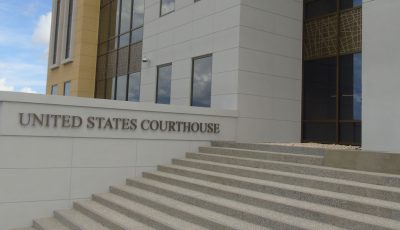Ex-firefighter testifies he owns Roberto’s alleged cell phone
Richard Benavente also admits writing letters to Judge Manglona
Richard S. Benavente, a former firefighter who pleaded guilty to a count of exploitation of a child, testified yesterday in the jury trial of Raymond B. Roberto in federal court, saying he owned the cell phone with the number 789-3443. One of Roberto’s three alleged underage victims earlier testified that Roberto used that number.
Benavente, 44, however, stated during cross-examination that he never told any FBI agents or police officers about owning that phone number. He said he was never asked about the number.
Benavente also denied claiming ownership of 789-3443 to cover up for Roberto.
The former firefighter also disclosed that he wrote three letters to U.S. District Court for the NMI Chief Judge Ramona V. Manglona, informing her, among other things, about him using the phone number.
Two of the alleged victims earlier testified that Roberto used the number during their text conversations.
Manglona is presiding over the ongoing trial of the 41-year-old Roberto, who is charged with three counts of enticing three minors to engage in prostitution and one count of witness tampering.
When Saipan Tribune left the courtroom yesterday afternoon, Assistant U.S. Attorney Rami S. Badawy was still cross-examining Benavente.
Roberto’s defense counsel, Joaquin Torres, called Benavente to the witness stand yesterday afternoon after the mother of one of three alleged victims completed her testimony.
Before allowing Benavente to testify, Manglona held a sidebar discussion with the prosecution and defense lawyers. Attorney Michael Dotts, the new court-appointed counsel for Benavente, was also asked to join the discussion.
After the sidebar discussion, Manglona explained to the former firefighter about a pending issue with his plea agreement with the U.S. government.
The U.S. government filed a motion to declare Benavente in breach of plea agreement. The motion is sealed.
During Torres’ direct examination, Benavente said he used cell phone number 789-3443 in 2013 and that he got the phone from two of Roberto’s alleged victims.
Benavente said he used the cell phone to call the girls. He said he last used the phone when he called one of the girls on July 16 or 19, 2013.
Benavente said he surrendered his cell phone to the Department of Public Safety when police officers arrested him. He said police also took his bag that contained SIM cards, memory cards, SD card reader, flash drive, and another cell phone.
Benavente said he was told that he screwed up his plea agreement and that as a result he may spend the rest of his life in jail.
He said that in the next interview with FBI agents and prosecutors about the cell phone, he just told them whatever they wanted to hear.
He said he wrote one letter notifying Manglona about the cell phone and that 789-3443 was his number. He said nobody instructed him to write the letters to Manglona.
He and Roberto at the time were staying in the same section at the Department of Corrections.
He said the FBI and prosecutors told him that he claimed to own 789-3443 because he was covering for Roberto and that he was screwing up his plea agreement and that more charges will be brought against him.
“Thirty-years in jail is a freaking long time. I would not see my kids,” he said.
He agreed with Torres that part of the plea agreement that he entered with the U.S. government was to cooperate with investigators and to testify truthfully, not just in Roberto’s case but in others as well.
He said after the first meeting with FBI agents and prosecutors on April 25, 2014, he wrote the letter to Manglona.
Benavente said before the first meeting started, FBI special agent Haejun Park asked him if he’s changing sides and he replied, “No, what are you talking about?”
He said they think he was covering up for Roberto.
“I’m not covering up for Roberto. I’m just trying to come up with the truth,” he said.
Benavente said that during the second interrogation in May 2014, he changed his story by telling them that it was actually not his number and that it was Roberto who asked him to write a letter to the judge.
“I don’t want to be in jail for 30 years so I just said yes to them,” he said.
Benavente said he changed his story, believing that maybe he will get back his plea agreement.
In the third meeting, Benavente went back to his original story that he owns the number. He said he made the decision after his mother told him to just tell the truth.
During cross-examination, Badawy asked Benavente that during his testimony, he stated that the girls gave him the cell phone. Benavente said he did not say cell phone, but SIM card.
When pressed, Benavente maintained that he stated SIM card. He agreed with Badawy, though, that he did not use the phone in March, April, and May 2013.
Benavente agreed with Badawy that when police officers interviewed him on July 19, 2013, he did not tell them about the cell phone number and SIM card. He said they never asked him about it.
Benavente had already pleaded guilty in February, on charges related to a June 23, 2013, incident where he had sex with a minor and recorded it using a cell phone. An FBI agent alleged that Benavente took videos of himself having sex with two 15-year-old girls.
The investigation on Benavente led to the filing of charges against Roberto as the latter allegedly engaged in sexual conduct with one of the same girls.
Before Benavente took the witness stand, the mother of one of three alleged victims completed her testimony.
The mother said a person told her that her daughter was having sex with Roberto so she asked her daughter through text about it. She said her daughter stated that Roberto never touched her.
When asked by Roberto’s counsel, Torres, why she did not call the FBI upon learning about her daughter’s alleged sexual relationship with Roberto, the mother said she did not do so because she wanted to know about it from Roberto himself.
She said she confronted Roberto but he stated he would not do that to her daughter.
The mother admitted that her daughter asked her to deliver a letter and her daughter’s friend’s letter to Roberto on Aug. 5, 2013.
She earlier testified that she read the letter while Roberto was driving his pickup truck and that Roberto was very upset about it.



























